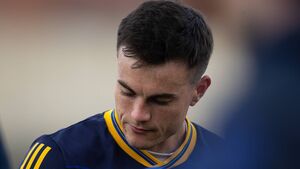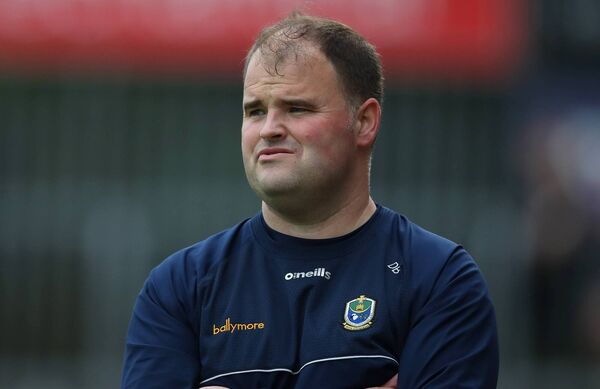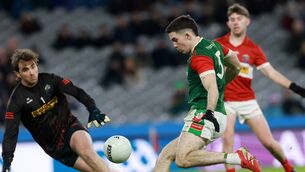A familiar cycle may be about to begin

Roscommon goalkeeper, Conor Carroll, cuts a dejected figure at the final whistle as the Rossies are knocked out of this year's senior football championship by Cork at Laois Hire O'Moore Park, Portlaoise, on Saturday afternoon. Picture: INPHO/Leah Scholes
It wasn’t supposed to be like this in Portlaoise.
O’Moore Park occupies a celebrated place in Roscommon football folklore — Frankie Dolan shooting the lights out against Kildare in a Saturday night thriller 22 years ago; Diarmuid Murtagh scoring a last-gasp winner against Cork in the 2014 All-Ireland U-21 semi-final and Enda Smith smashing home a late goal to finally settle a duel in the sun against Armagh in the sweltering summer of 2018.
This time, though, the home of Laois GAA wasn’t a happy hunting ground. When Daniel O’Mahony got a hand to Diarmuid Murtagh’s attempt for a two-pointer that would have edged Roscommon into the last 12, it was Cork who were celebrating.
They live to fight another day, while for Roscommon a season that felt like it has been fizzling out for the last few months came to a drab conclusion.
The natural disappointment that comes with the realisation that another championship campaign is over soon settled on the fans in Portlaoise. Last Saturday was a day when the familiar faces — the regulars at national league matches — turned out in strength and the crowd was more in keeping with a league match than a championship showdown.
Nonetheless, this was not the gut-punch of snatching defeat from the jaws of victory against Clare three years ago or the agonising loss to Cork in 2023. Perspective kicked in quickly.
Many fans, certainly the ones I met, were of the view that even if the Rossies had salvaged a draw against Cork, it would have only delayed the inevitable for another week.
The difference in physicality, angles of running and pace with the Donegal/Mayo match the following day in Hyde Park was stark. One Roscommon fan said to me that it was like comparing the Europa Conference League with the Champions League.
A trip to face either Dublin or Donegal would not have excited anyone and those who think Roscommon would have been favourites to beat Down in Páirc Esler haven’t been paying attention for the last three months.
Since March 1st, when they beat Cork in the league, Roscommon have played eight matches and beaten only London. Davy Burke’s comments after the defeat to Cavan in Hyde Park were a turning point.
Whatever one’s perspective on under-performing players, the manager lost the support of many fans after that game. The swashbuckling minors and, to an extent, the valiant U-20s have taken much of the attention normally reserved for the seniors.
Against Meath it was Enda Smith who dragged Roscommon back into the match. Last Saturday it was the heroic Brian Stack who railed against the seemingly inevitable. Daire Cregg, Eddie Nolan and Cian McKeon were among those who followed the captain’s example.
Ultimately, bravery wasn’t enough because chances were spurned. Counting a couple of two-pointers, the Rossies left 1-6 behind them down the stretch.
The decisive moment was when Míchéal Aodh Martin denied Cregg when he was one-on-one with the goalie after a sublime Enda Smith pass. It was all eerily reminiscent of Martin thwarting Dairmuid Murtagh two years ago.
This defeat certainly doesn’t lie at Cregg’s door. He was terrific last Saturday, scoring 0-5 from play in what was probably his best display since the win over Tyrone 12 months ago.
Like Smith against Meath, and all good players, he put his miss behind him to slot his next two shots over the bar. Unfortunately, a recurring problem for Roscommon’s much-vaunted forwards is that not enough of them play well together in big matches to sweep aside top-level opposition.
Too often in the GAA, theories are bandied about which become accepted wisdom. This year it was that the new rules would suit Roscommon. It seemed a fair call given the calibre of the forwards in the team. Instead, Roscommon have been one of the few teams playing at Sam Maguire level who have struggled to adapt to the new rules.
In one of his post-match interviews early in the season Davy Burke said he and his management had been “energised” by the new rules. Yet, for 50 minutes last Saturday, Roscommon’s slow and ponderous build-up play was more typical of a team who were still playing under the 2024 rulebook.
In the first half Stack and Senan Lambe were among the few players who realised the urgency of getting quick ball to the inside forwards before the Cork defence could reset. That laboured approach play has been a feature of Roscommon’s play for much of the season.
Cork are an average team — there’s a solid argument that both teams have regressed since their 2023 meeting — who scored just a solitary point in the last 15 minutes. Nevertheless, they pounced on the many Roscommon turnovers, broke more quickly and with greater intent than their opponents. The Rebels would have had a massive lead at half time if their three clearcut goal chances had flown under, rather than over, the bar.
After walloping over five two-pointers in the second-half against Meath, Roscommon reverted to what has been the norm since early spring and didn’t slot any two-pointer. In the new high-scoring world of Gaelic football, a team that doesn’t score a goal or a two-pointer is not going to win.

Other issues have not been fixed since the opening league match against Down. The defence is too open when opposing players run hard at it — last Saturday it was Ian Maguire in the first half.
The kernel of so many problems this year has been the travails at midfield where Roscommon have struggled to win either primary possession or breaking ball, especially on their own kickout. It often boils down to physicality. It was the case again in the first half last Saturday.
By full time, Roscommon had won 14 out of 24 of their own kickouts. The kickout under the new rules can be a lottery but, for context, Donegal won 16 out of their 21 kickouts in the Hyde while Mayo won 19 out of 25.
Much attention will now focus on the manager’s future. After the match, Burke said it wasn’t the time for a big announcement although his term is up. He also listed the number of new players who have come in during his tenure.
Both points are fair.
The counter-argument is how many of those new faces have become regular starters? One of those Burke name-checked was Declan Kenny — one of the standout players in last year’s club championship — who had to wait until the last five minutes of Roscommon’s fifth and, as it transpired, last game to make his championship debut.
In the spring Conor Hand and Colm Neary were nailed-on starters. Yet with the team’s year on the line, they weren’t introduced until the last 20 minutes. In contrast, since Senan Lambe got a sustained run in the team, he has been terrific.
As I wrote here after the Meath match, the progress of many of the graduates from the team who reached the 2021 All-Ireland U-20 final has stalled. Others, most notably Colin Walsh, were discarded too quickly, especially as Stack is oscillating between full-back, centre-back and/or marking the opposition's best forward.
The team hasn’t been settled all year and the lack of consistency in selection has surely been a factor in the absence of rhythm and coherence in the team’s play. Roscommon used six different players at centre-back and ended the year without a settled midfield.
The protracted, exhausting search for a manager three years ago left its mark on everyone associated with Roscommon football. It has made officials, fans and media wary of jettisoning another management too hastily.
What also needs to be realised is that ongoing problems at senior level are not all down to Davy Burke. If Burke is going to get a new contract, it must be for at least two years.
However, the strongest argument against change can’t be how tough it will be to find a new manager. If the powers-that-be feel that a change is needed, they have to move swiftly, draw up a list of candidates and go for it.
A familiar cycle may be about to begin again.





